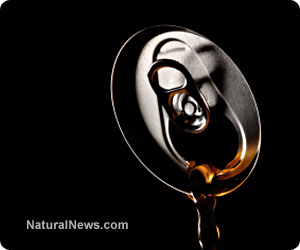Diet soda, aspartame linked to premature deaths in women
 Sunday, March 30, 2014 Sunday, March 30, 2014by Mike Adams, the Health Ranger Editor of NaturalNews.com (See all articles...) Tags: diet soda, aspartame, death risk |

(NaturalNews) A decade-long study of 60,000 women has confirmed that drinking diet soda sweetened with aspartame is linked with a 30 percent increase in heart attack risk and a 50 percent increase in death risk.
The findings, presented at the American College of Cardiology(1), have already been partially swept under the rug with the false explanation that diet drinks don't necessarily cause these risks but are instead merely correlated with them. "Women who toss back too many diet sodas may be trying to make up for unhealthy habits," claims an article on CNBC,(2) while citing no evidence whatsoever to support the claim. Keep in mind that any time a synthetic vitamin is correlated with increased mortality, the entire scientific community immediately describes those synthetic vitamins as "causing" death. Correlation is causation only when industry-funded scientists say it is.
Aspartame is a neurotoxin
What scientists refuse to explore -- even when the data clearly show a strong death risk association -- is that aspartame is a neurotoxin. The reason why women who drink diet soda have a 50 percent increased death risk is, of course, far more likely to be caused by what's in the diet soda rather than some lifestyle choice.Aspartame, after all, is made from the feces of genetically engineered bacteria. It is not a natural sugar but rather a chemical compound created in an industrial lab. Used in diet sodas, it breaks down into a number of chemical compounds including formaldehyde and methanol. During digestion, the formaldehyde is oxidized into formic acid, a chemical known to cause toxicity in mammalian biology. Formic acid is also secreted by ants as part of their "chemical weapons" arsenal.
Aspartame linked to long list of neurological problems
Aspartame denialists try to pretend that all this formaldehyde, methanol and formic acid has no effect on human health. Their argument is identical to that of GMO denialists: "GMOs are harmless!" It's even the same argument as mercury denialists: "Mercury is harmless!"Why, then, is aspartame so frequently linked to blurred vision, headaches and neurological problems when repeatedly consumed in the form of diet drinks? In fact, there are over 90 side effects linked to aspartame consumption, including headaches/migraines, dizziness, seizures, nausea, numbness, rashes, depression, irritability, insomnia, hearing loss, vision problems, loss of taste vertigo and memory loss.
Soda companies and misinformed doctors all try to pretend none of these side effects are real -- that people are all imagining headaches, blurred vision, numbness, insomnia and so on. That's how unethical the soda industry is: they poison their own customers with a neurotoxic chemical, then call them delusional when they suffer neurological side effects.
If you drink diet soda, you are murdering yourself
The bottom line in all this? If you drink diet soda, you are essentially murdering yourself. Call it "slow suicide."There are a thousand beverages healthier than diet sodas: tea, fruit juice, mineral water, raw almond milk... even non-diet sodas are better for you than diet sodas! (And diet sodas have been conclusively proven to have no effect whatsoever on weight loss. So drinking them is a useless diet gesture to begin with.)
If for some reason you are still drinking diet soda, find a healthier beverage and stop poisoning yourself to death.
From the American College of Cardiology website:
[A] study led by Ankur Vyas, MD, of the University of Iowa found that postmenopausal women who consumed two or more diet drinks a day were 30 percent more likely to experience a cardiovascular event and 50 percent more likely to die from related cardiovascular disease than women who never, or only rarely, consumed diet drinks. The analysis of 59,614 participants in the Women's Health Initiative Observational Study, who had an average age of 62.8 and no history of cardiovascular disease, saw that after an average follow-up of 8.7 years, the primary cardiovascular outcome occurred in 8.5 percent of the women consuming two or more diet drinks per day compared to 6.9 percent in the five-to-seven drinks per week group; 6.8 percent in the one-to-four drinks per week group; and 7.2 percent in the zero-to-three per month group. The difference persisted when researchers adjusted for other cardiovascular risk factors and co-morbidities. The association between diet drinks and cardiovascular disease warrants further study to define the relationship, Vyas said.
Sources for this article include:
1) http://www.cardiosource.org/en/News-Media/Pu...
2) http://www.cnbc.com/id/101536768
Diet soda at FETCH.news
Get independent news alerts on natural cures, food lab tests, cannabis medicine, science, robotics, drones, privacy and more.
 About the author:Mike Adams (aka the "Health Ranger") is a best selling author (#1 best selling science book on Amazon.com) and a globally recognized scientific researcher in clean foods. He serves as the founding editor of NaturalNews.com and the lab science director of an internationally accredited (ISO 17025) analytical laboratory known as CWC Labs. There, he was awarded a Certificate of Excellence for achieving extremely high accuracy in the analysis of toxic elements in unknown water samples using ICP-MS instrumentation. Adams is also highly proficient in running liquid chromatography, ion chromatography and mass spectrometry time-of-flight analytical instrumentation.
About the author:Mike Adams (aka the "Health Ranger") is a best selling author (#1 best selling science book on Amazon.com) and a globally recognized scientific researcher in clean foods. He serves as the founding editor of NaturalNews.com and the lab science director of an internationally accredited (ISO 17025) analytical laboratory known as CWC Labs. There, he was awarded a Certificate of Excellence for achieving extremely high accuracy in the analysis of toxic elements in unknown water samples using ICP-MS instrumentation. Adams is also highly proficient in running liquid chromatography, ion chromatography and mass spectrometry time-of-flight analytical instrumentation.
Adams is a person of color whose ancestors include Africans and Native American Indians. He's also of Native American heritage, which he credits as inspiring his "Health Ranger" passion for protecting life and nature against the destruction caused by chemicals, heavy metals and other forms of pollution.
Adams is the founder and publisher of the open source science journal Natural Science Journal, the author of numerous peer-reviewed science papers published by the journal, and the author of the world's first book that published ICP-MS heavy metals analysis results for foods, dietary supplements, pet food, spices and fast food. The book is entitled Food Forensics and is published by BenBella Books.
In his laboratory research, Adams has made numerous food safety breakthroughs such as revealing rice protein products imported from Asia to be contaminated with toxic heavy metals like lead, cadmium and tungsten. Adams was the first food science researcher to document high levels of tungsten in superfoods. He also discovered over 11 ppm lead in imported mangosteen powder, and led an industry-wide voluntary agreement to limit heavy metals in rice protein products.
In addition to his lab work, Adams is also the (non-paid) executive director of the non-profit Consumer Wellness Center (CWC), an organization that redirects 100% of its donations receipts to grant programs that teach children and women how to grow their own food or vastly improve their nutrition. Through the non-profit CWC, Adams also launched Nutrition Rescue, a program that donates essential vitamins to people in need. Click here to see some of the CWC success stories.
With a background in science and software technology, Adams is the original founder of the email newsletter technology company known as Arial Software. Using his technical experience combined with his love for natural health, Adams developed and deployed the content management system currently driving NaturalNews.com. He also engineered the high-level statistical algorithms that power SCIENCE.naturalnews.com, a massive research resource featuring over 10 million scientific studies.
Adams is well known for his incredibly popular consumer activism video blowing the lid on fake blueberries used throughout the food supply. He has also exposed "strange fibers" found in Chicken McNuggets, fake academic credentials of so-called health "gurus," dangerous "detox" products imported as battery acid and sold for oral consumption, fake acai berry scams, the California raw milk raids, the vaccine research fraud revealed by industry whistleblowers and many other topics.
Adams has also helped defend the rights of home gardeners and protect the medical freedom rights of parents. Adams is widely recognized to have made a remarkable global impact on issues like GMOs, vaccines, nutrition therapies, human consciousness.
In addition to his activism, Adams is an accomplished musician who has released over a dozen popular songs covering a variety of activism topics.
Click here to read a more detailed bio on Mike Adams, the Health Ranger, at HealthRanger.com.
Take Action: Support Natural News by linking to this article from your website
Permalink to this article:
Embed article link: (copy HTML code below):
Reprinting this article:
Non-commercial use OK, cite NaturalNews.com with clickable link.
Follow Natural News on Facebook, Twitter, Google Plus, and Pinterest
- Newly released JFK files reveal Pentagon's role in creating Lyme disease and covid in the same lab
- Trump nominates VACCINE ZEALOT Susan Monarez to lead the CDC, sidelining RFK Jr.'s reform efforts
- BEWARE: USDA allows genetically engineered vaccines to infiltrate organic food production
- Obama accused of laundering USAID funds to fuel global protest movements, regime change operations
- Festive flavors: The sweet history, nutritional profile and health benefits of pecan pie
- Dr. Mike Yeadon releases 15-minute testimony - WATCH - about genocidal intent of COVID “vaccines”
- Analysis: The coming economic collapse, a mass uprising and Trump's three secret weapons to halt the growing revolt
- Elon Musk: Aliens could be here on Earth RIGHT NOW
- Big Pharma's media takeover: How drug companies bought the news - and your health
- Trump reverses course on Gaza plan, says “nobody is expelling Palestinians”
- Survival 101: Effective EMF blocking techniques
- California's social media censorship law struck down: A victory for free speech or a threat to online safety?
- Rep. Nancy Mace introduces bill to ban biological males from female facilities on federal property
- HUGE: Putin claims 2020 election fraud in U.S. sparked Ukraine war, calls for peace talks with Trump
- Big Pharma's $8 Billion bribery scheme exposed: how doctors are pushed to prescribe junk science, not heal
- Reclaim your health: How midlife exercise reverses years of inactivity
- Chris Rufo finally reveals abuse liberals unleashed on his wife and young kids...
- Pilots report mysterious lights 'moving at extreme speeds' across Oregon skies
- Elon Musk: Aliens could be here on Earth RIGHT NOW
- EPA advisor admits the agency is funneling billions to climate groups ahead of Trump’s return to White House
- Trump reverses course on Gaza plan, says “nobody is expelling Palestinians”
- Reclaim your health: How midlife exercise reverses years of inactivity
- A lack of integrity in Academia: Harvard professor found GUILTY of fraudulent research to promote CRT theory
- Space war brewing? Russia threatens to destroy Starlink satellites
- Big Pharma's $8 Billion bribery scheme exposed: how doctors are pushed to prescribe junk science, not heal
- Mike Adams Sermon 66: God will DESTROY ISRAEL for its wickedness
- Rep. Nancy Mace introduces bill to ban biological males from female facilities on federal property
- Survival 101: Effective EMF blocking techniques
- 5 Simple steps to boost your brainpower: How to strengthen executive function in a distracted world
- Historian warns Israel may be entering an “IRREMEDIABLE DECLINE”
- Florida takes a stand: DeSantis proposes permanent ban on mRNA vaccine mandates
- RFK Jr.'s SSRI antidepressant investigation sparks liberal meltdown, exposes Big Pharma's dangerous game
- New York politicians push bill allowing governor to indefinitely detain the unvaccinated on a whim
- Sales of survival bunkers rise following Russia’s use of the Oreshnik hypersonic ballistic missile
- Pilots report mysterious lights 'moving at extreme speeds' across Oregon skies
- Newly released JFK files reveal Pentagon's role in creating Lyme disease and covid in the same lab
- EPA advisor admits the agency is funneling billions to climate groups ahead of Trump’s return to White House
- The Health Ranger releases “Vaccine Zombie” song and music video, using AI-animated zombies for the music video
- The pandemic as a tool for INDOCTRINATION: Understanding “The Indoctrinated Brain” by Dr. Michael Nehls
- California's social media censorship law struck down: A victory for free speech or a threat to online safety?
- Dr. Mike Yeadon releases 15-minute testimony - WATCH - about genocidal intent of COVID “vaccines”
- Congratulations to the FULLY UNVACCINATED as you resisted the COVID-19 PROPAGANDA MACHINE fueled by over $100 BILLION
- Mike Adams releases country western hit single: Goin’ Back in Time is Comin’ Home
- RFK Jr. clears key hurdle: Sen. Susan Collins backs controversial HHS nominee, signaling a new era for health policy
- Mike Adams releases music poetry sensation: A Child of God
- Mike Adams releases new song and music video: Nothing More Disgusting Than a Globalist
- Unpacking the Lies That We’ve Been Fed – new song and music video released by Mike Adams, the Health Ranger
- Trump administration takes on global censorship: A new frontier for free speech advocacy
- Florida takes a stand: DeSantis proposes permanent ban on mRNA vaccine mandates
- “Why we influenced the 2020 elections”: Facebook files reveal the coordinated effort to bury the Hunter Biden laptop story
- Ex-FBI Chief EXPOSES disgraceful government coverups of Oklahoma City Bombing, Kennedy assassinations, 9/11 WTC, and "Terrorism" as plot to destroy Constitution
- Michigan sheriff announces criminal investigation into 2020 election crimes, Dominion Voting Systems
- Israeli soldiers accused of even more torture and abuse in the West Bank
- Federal judge backs Trump's mass firings, clearing path for government downsizing
- Red Cross issues warning to stop blood plasma donations from vaccinated people
- Scientists confirm: GENIUS brain function can be spontaneously unleashed in humans without any apparent cause
- EPA advisor admits the agency is funneling billions to climate groups ahead of Trump’s return to White House
- HYSSOP: What research reveals about the health benefits of this ancient holy herb
- Two containers with completed ballots fall out of truck in Florida
- Fully vaccinated about to see “tsunami” of illness and death, warns virologist
- Today I asked our AI language model “Neo” about which phytonutrients or phytochemicals can block the spike protein related to SARS-CoV-2 … Here is what it answered…
- Global leaders unite to clamp down on “misinformation” with UN-backed Cascais Declaration
- BREAKING: 2025 NDAA authorizes mandatory military draft of WOMEN across America… as Pentagon pursues global NUCLEAR war with both Russia and China at the same time
- Michael Yon warns of a ZIONIST TAKEOVER in Trump’s second administration
- BOMBSHELL: DNA testing kits are a SCAM to develop ethnic-specific bioweapons
- Ozempic and Wegovy weight loss drugs are injectable LIZARD VENOM PEPTIDES that may unleash a devastating wave of organ failure… side effects align with symptoms of SNAKE BITES
- Israeli soldiers accused of even more torture and abuse in the West Bank
- These 13 countries just signed an agreement to engineer a global FAMINE by destroying food supply
- NASA admits that climate change occurs because of changes in Earth’s solar orbit, and NOT because of SUVs and fossil fuels
- RFK Jr. clears key hurdle: Sen. Susan Collins backs controversial HHS nominee, signaling a new era for health policy
- Sermon 30: How Jesus reveals Caesar’s FAKE CURRENCY and FALSE AUTHORITY
- Coriander seeds: Ancient medicine backed by modern science
Science News & Studies
Medicine News and Information
Food News & Studies
Health News & Studies
Herbs News & Information
Pollution News & Studies
Cancer News & Studies
Climate News & Studies
Survival News & Information
Gear News & Information
News covering technology, stocks, hackers, and more



"Big Tech and mainstream media are constantly trying to silence the independent voices that dare to bring you the truth about toxic food ingredients, dangerous medications and the failed, fraudulent science of the profit-driven medical establishment.
Email is one of the best ways to make sure you stay informed, without the censorship of the tech giants (Google, Apple, Facebook, Twitter, YouTube, etc.). Stay informed and you'll even likely learn information that may help save your own life."
–The Health Ranger, Mike Adams












































